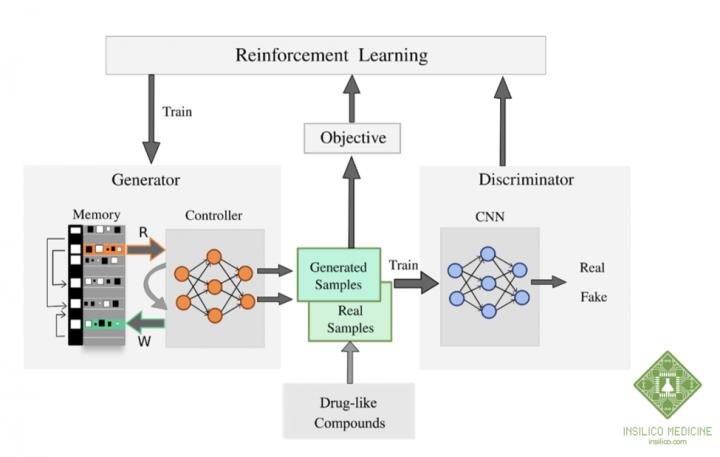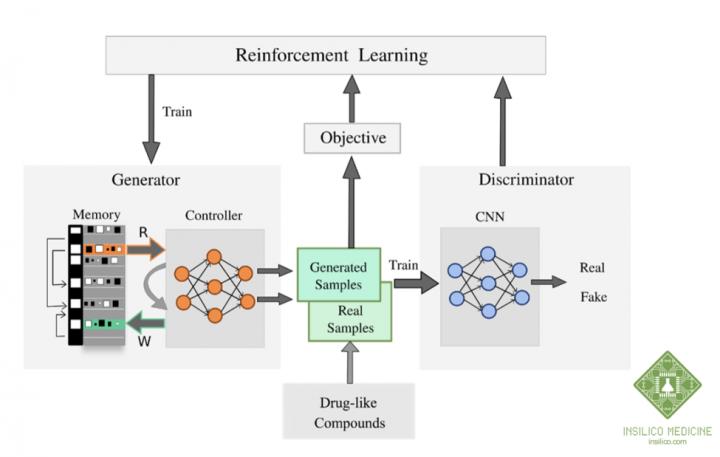
Credit: Insilico Medicine
Tuesday, June 26st, Rockville, MD – Today, Insilico Medicine, Inc., a Rockville-based next-generation artificial intelligence company specializing in the application of deep learning for target identification, drug discovery and aging research announces the publication of a new research paper "Reinforced Adversarial Neural Computer for De Novo Molecular Design" in The Journal of Chemical Information and Modeling. The authors presented an original deep neural network architecture named Reinforced Adversarial Neural Computer (RANC) for the de novo design of novel small-molecule organic structures utilizing the generative adversarial network (GAN) and reinforcement learning (RL) methods.
"In this work, we introduced RANC architecture for de novo molecular design. Our engine generates more unique and diverse structures as well as clusters with the lengths close to the reference samples, keeping the distributions of key molecular descriptors as in the training sets. As a result, many of the generated structures meet the crucial criteria used in medicinal chemistry of today and are able to pass medical chemistry filters. I hope this approach will become a starting point to making perfect molecules for specific targets and multiple targets that will have a much higher chance of becoming great drugs", said Evgeny Putin, the deep learning lead at Insilico Medicine.
In silico modeling is a crucial milestone in modern drug design & development. Although computer-aided approaches in this field are well-studied, the application of deep learning methods in this research area is at the beginning facing a lot of challenges.
The comparative results have shown that RANC trained on the SMILES string representation of the molecules outperforms the other methods by several metrics relevant to drug discovery: the number of unique structures, passing medicinal chemistry filters, Muegge criteria and high quantitative estimate of drug-likeness scores. RANC is able to generate structures that match the distributions of the key chemical features/descriptors (e.g. MW, logP, TPSA) and lengths of the SMILES strings in the training dataset. Therefore, RANC can be reasonably regarded as a promising starting point to develop novel molecules with activity against different biological targets or pathways.
This work was carried out in collaboration with one of the most prominent groups in AI-enabled chemistry and quantum chemistry, lead by Prof. Alan Aspuru-Guzik. One of the co-authors of the paper is Benjamin Sanchez-Lengeling – the author of the Objective-Reinforced Generative Adversarial Networks (ORGAN), one of the first objective–reinforced molecular generators.
From a medicinal chemistry perspective, it would be very interesting to investigate how the results of modeling depend on the carefully selected reference compounds as well as the application of the model for the generation of structures with biological activity toward specific targets.
For its work in the field of artificial intelligence for drug discovery and development, Insilico Medicine received the Frost & Sullivan 2018 North American Artificial Intelligence for Aging Research and Drug Development Technology Innovation Award. The company plans to use GAN-RL systems to target age-related diseases and aging itself.
"Technology leadership in artificial intelligence for drug discovery and biomarker development, academic excellence, extensive collaborations with pharmaceutical and consumer companies, novel methods of attracting top talent, and increasing global reach have allowed Insilico Medicine to build a credible and sustainable business model in the nascent longevity biotechnology industry," noted Neelotpal Goswami. "In recognition of its pioneering research and ability to introduce novel products and solutions for age management, Frost & Sullivan is pleased to present it with the 2018 Technology Innovation Award."
###
Insilico Medicine is regularly publishing research papers in peer-reviewed journals. The company was first who applied deep generative adversarial networks (GANs) to the generation of new molecular structures with specified parameters and published seminal proof of concept papers in the field. The paper published in Molecular Pharmaceutics in 2016 demonstrated the proof of concept of the application of deep neural networks for predicting the therapeutic class of the molecule using the transcriptional response data, received the American Chemical Society Editors' Choice Award. A recent paper published in November 2017 described the application of the next-generation AI and blockchain technologies to return the control over personal data back to the individual. One of the latest papers published in the Journals of Gerontology demonstrated the application of the deep neural networks to assessing the biological age of the patients.
For further information, images or interviews, please contact:
Contact: Qingsong Zhu, PhD
[email protected]
Website: http://www.Insilico.com
About Insilico Medicine, Inc
Insilico Medicine, Inc. is an artificial intelligence company headquartered at the Emerging Technology Centers at the Johns Hopkins University Eastern campus in Baltimore, with R&D and management resources in Belgium, Russia, UK, Taiwan and Korea sourced through hackathons and competitions. The company and its scientists is dedicated to extending human productive longevity and transforming every step of the drug discovery and drug development process through excellence in biomarker discovery, drug development, digital medicine and aging research.
Insilico pioneered the applications of the generative adversarial networks (GANs) and reinforcement learning for generation of novel molecular structures for the diseases with a known target and with no known targets. In addition to working collaborations with the large pharmaceutical companies, the company is pursuing internal drug discovery programs in cancer, dermatological diseases, fibrosis, Parkinson's Disease, Alzheimer's Disease, ALS, diabetes, sarcopenia, and aging. Through a partnership with LifeExtension.com the company launched a range of nutraceutical products compounded using the advanced bioinformatics techniques and deep learning approaches. It also provides a range of consumer-facing applications including Young.AI.
In 2017, NVIDIA selected Insilico Medicine as one of the Top 5 AI companies in its potential for social impact. In 2018, the company was named one of the global top 100 AI companies by CB Insights. In 2018 it received the Frost & Sullivan 2018 North American Artificial Intelligence for Aging Research and Drug Development Award accompanied with the industry brief. Brief company video: https://www.youtube.com/watch?v=l62jlwgL3v8.
Media Contact
Qingsong Zhu
[email protected]
443-451-7212
@InSilicoMeds
http://www.insilicomedicine.com
Related Journal Article
http://dx.doi.org/10.1021/acs.jcim.7b00690





